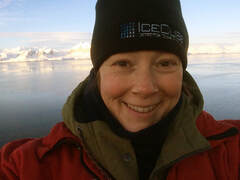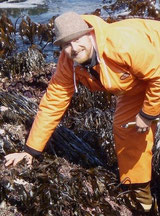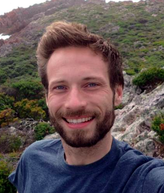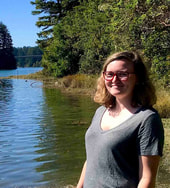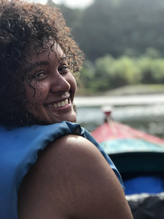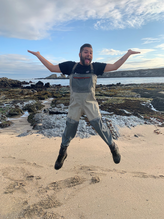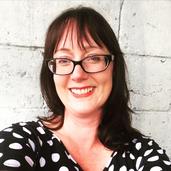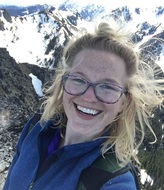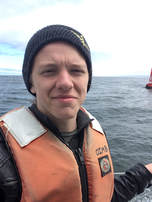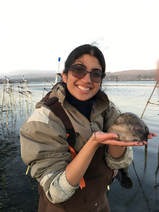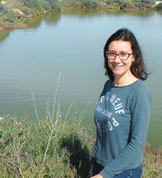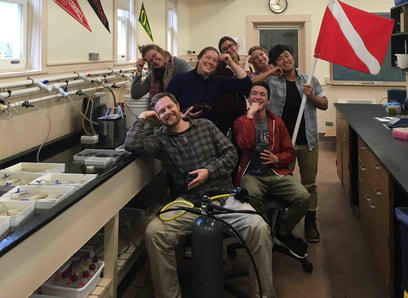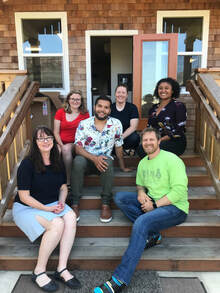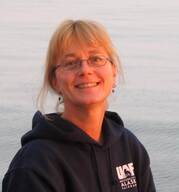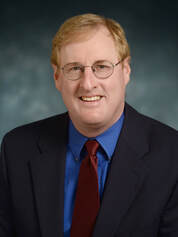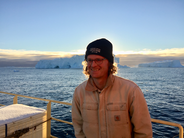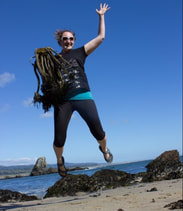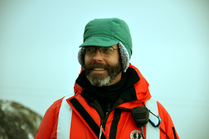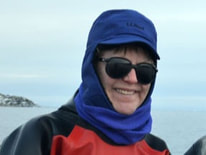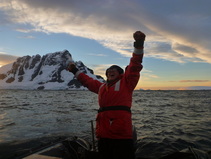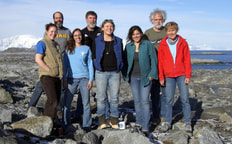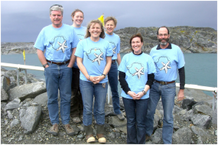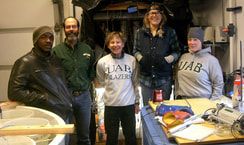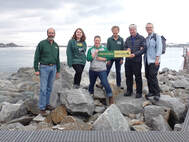University of Alaska Southeast
|
Julie Schram, Assistant Professor of Animal Physiology
I am primarily an integrative marine invertebrate zoologist and use analytical techniques to address how changes in organismal physiology can influence food-web relationships. In my recent research, I have investigated the non-lethal impacts of ocean warming and acidification on marine grazers of the central western Antarctic Peninsula and used lipid based tissue biomarkers to investigate food web relationships in several Pacific coast systems from Alaska to the southern Oregon Coast. I am currently working with the Fire and Ice Alaska EPSCoR team to investigate the impacts of drivers of changes in the ecology of glacial and non-glacial estuaries along the Gulf of Alaska. |
|
You?
I am currently looking for undergraduate students to work with me on Fire and Ice Alaska EPSCoR related projects at the University of Alaska Southeast. I am also developing pilot projects that will look at how changes in environmental exposure (e.g., ocean warming and acidification, freshening) may influence food web dynamics. Please contact me if you are interested in learning more! |
Coastal Trophic Ecology Laboratory at the University of Oregon
|
Aaron Galloway, Assistant Professor, Oregon Institute of Marine Biology (Principle Investigator of Coastal Trophic Ecology lab)
Aaron works on aquatic trophic ecology, with a focus on fatty acids as biomarkers for inferring food web relationships and tracking across-system energy subsidies. Aaron completed his Ph.D. in 2013 at the University of Washington School of Aquatic and Fishery Sciences, working at Friday Harbor Laboratories. Aaron is currently an Assistant Professor at the University of Oregon Institute of Marine Biology. |
|
Reyn Yoshioka; PhD Candidate (2016 - Present)
Reyn's interests are in the trophic ecology and parasitism of marine invertebrates. He received his undergraduate degree from Cornell University, having since worked in Drew Harvell's lab studying disease ecology of corals, eelgrass, and sea stars. Check out Reyn's marine photography here! |
|
Ross Whippo; PhD student (2018 - Present)
Ross's research is broadly focused on nearshore marine ecology, and how biodiversity and food webs structure communities. He graduated with a Bachelors in Aquatic and FIshery Sciences from the University of Washington in 2011, and a Masters in Zoology from the University of British Columbia in 2013. Since then he has worked all over the world as central technician and research associate for the Smithsonian's MarineGEO program. Currently, he is exploring food web dynamics in the kelp forests of Oregon. You can learn more about him on his website. |
|
Natalie Thompson; Undergraduate REU and Sea Grant Intern (Summer 2018 - 2020)
Natalie is a second-year student at Southwestern Oregon Community College studying marine biology. She is working in CTELab as an intern; she was previously an intern in the CTELab through the REU (Research Experience for Undergraduates) program and is currently working Dungeness crab projects funded by Sea Grant. She has studied the behavior of marine isopods in response to chemosensory and visual cues too, check out her blog for more details on this project. After graduating with her Associate of Science, Natalie plans on transferring to a four-year university to continue her education. |
Previous lab members
|
Hannah Hayes; Exploration of Marine Biology on the Oregon Coast (EMBOC) Research Experience for Undergraduate (REU) intern (Summer 2019) Hannah is currently a marine biology major at UCLA. During her REU internship she focused her research on how a reduced pH simulating ocean acidification affects the foraging behavior of juvenile Dungeness crabs. She presented the results of her research at the 25th Biennial Coastal and Estuarine Research Federation conference in 2019. She is planning on attending graduate school and continuing her research in the marine sciences. Steven Manos; Exploration of Marine Biology on the Oregon Coast (EMBOC) Research Experience for Undergraduate (REU) intern (Summer 2019)
Steven is an enviormental studies major who is passionate about conservation and restoration. He is interested in wetland restoration and plans on attending graduate school after the completion of his undergraduate degree. Steven’s research done during his REU internship focused on how reduced pH effects juvenile Dungeness crab behavior. He recently attended CERF 2019 in Mobile Alabama and the 2019 Oregon State Of The Coast conference in Lincoln city Oregon, where he won Best Student Poster presentation for his presentation of his and Hannah's summer research projects. Steven will be completing his undergraduate degree at Portland State University. Erica Street, Partners-in-Science Fellow (2018-2019)
Erica is a science teacher at North Bend High School, and together with Julie was awarded a Partners-in-Science grant through the M. J. Murdock Charitable Trust to conduct research on the effects of ocean acidification on juvenile Dungeness crabs. In the summer of 2018, her research focused on developing a methodology for doing preference/avoidance behavior studies with juvenile Dungeness crabs and testing the effects of cue concentration on behavioral responses and acclimation to food cues. She earned her undergraduate degree in Biology from Wells College, and received a Masters degree in Math and Science Education from the University of California at Berkeley. |
|
Zofia Knorek; Master's graduate student (2016 - 2018) Zofia is interested in the trophic ecology of invasion—when a non-indigenous species is introduced, how does it shift food web dynamics? She earned her BA in Biology from Hendrix College. Most recently, she was an AmeriCorps service member at the Port Townsend Marine Science Center in Washington. Zofia is now a Ph.D student at the University of North Carolina-Chapel Hill in Joel Foedrie's lab. Visit Zofia’s website! |
|
Zade Clark-Henry; Exploration of Marine Biology on the Oregon Coast (EMBOC) Research Experience for Undergraduate (REU) intern (Summer 2017)
Zade is a junior at Oregon State University studying natural resources with an emphasis in forest ecosystems and ecological restoration. He is an REU (Research Experience for Undergraduates) intern at CTELab at the Oregon Institute of Marine Biology investigating the influence of various diets on molt and growth rate of Dungeness crabs. After graduating, he hopes to work either in long-term ecological research projects, or in habitat conservation for forest and stream ecosystems. For more details on Zade's research experience in the CTELab at OIMB, please visit his blog! |
|
Leela Dixit; Exploration of Marine Biology on the Oregon Coast (EMBOC) Research Experience for Undergraduate (REU) intern (Summer 2017) Leela is a fourth year Evolution, Ecology, and Biodiversity major at University of California, Davis working in CTELab as an REU (Research Experience for Undergrads) intern. She is interested in looking at what influences the coloration of marine isopods, specifically at the importance of environmental cues such as visual or chemical cues. Leela plans on pursuing research and graduate school in the future. For more information on her research experiences in the CTELab check out her blog! |
|
Elena Rubio López; Visiting PhD student, Universidad de Cádiz, Spain (Fall 2016)
Elena is interested in marine ecology, fisheries and sustainable aquaculture. In her Ph.D. research she is studying trophic relationships of aquatic communities in restored wetlands used for aquaculture in the Guadalquivir estuary (Spain) using fatty acids biomarkers. Elena visited the Coastal Trophic Ecology Lab for 6 months in the summer-fall of 2016. |
Antarctic Sea Ice-Biodiversity Gradient collaborative project
|
Katrin Iken; Professor at University of Alaska Fairbanks
My research is mainly centered around trophic interactions between organisms. This involves dietary composition, feeding habits and consumption rates of invertebrates, macroalgal-herbivore interactions, stable isotope analysis of food web structures, etc. It also involves chemical defenses of macroalgae and invertebrates against grazers and predators. I am generally interested in shallow water community diversity, dynamics and ecology, especially in both polar regions, and in deep-sea communities. Most of my shallow water work uses scientific diving as a research tool. |
|
Andrew Klein; Professor at Texas A & M University
My current research is focused on the following projects:
|
|
Alexander T. Lowe; Postdoc with MarineGEO
I am coastal marine scientist currently working as a postdoc with the MarineGEO program at the Smithsonian Institution. My research uses an ecosystem-based approach to understand the effects of environmental change on aquatic organisms through food web and physiological interactions in coastal estuaries and marine ecosystems. I integrate oceanography, physiology and community ecology. This theme has developed through a diversity of research projects in freshwater, marine, urban, polar, pelagic, nearshore and subtidal ecosystems. |
|
Sabrina Heiser; PhD Candidate at UAB
Sabrina studies inter- and intraspecific interactions between organisms can be a form of communication, environmental sensing, or defense and are often mediated by secondary metabolites. Sessile marine organisms like macroalgae commonly produce chemical defenses against grazers, pathogens, and biofoulers. The biomass of macroalgal forests around Palmer Station on the Western Antarctic Peninsula is comparable to temperate kelp forests and provide vital functions to the ecosystem. Plocamium cartilagineum is a red understory alga that is common in these macroalgal forests. It supports a very high abundance of amphipods of which most are not able to feed on the heavily chemically defended P. cartilagineum except for Paradexamine fissicauda. |
Collaborators on this project also include additional members of the UAB in Antarctica team, including Jim McClintock, Chuck Amsler, and Maggie Amsler. For information on their work, see below.
University of Alabama at Birmingham in Antarctica
|
James B. McClintock; UAB Endowed University Professor of Polar and Marine Biology
Over the past decade James B. McClintock's research has encompassed studies of the impacts of rapid climate change and ocean acidification on Antarctic marine algae and invertebrates. His expertise on the ecological impacts of climate change and ocean acidification on marine life of the Antarctic Peninsula has garnered numerous invited lectures and he writes in the popular literature on this timely topic. More on Dr. McClintock and his Antarctic research and popular science books (Lost Antarctica: Adventures in a Disappearing Land and A Naturalist Goes Fishing) are available on his website. |
|
Charles Amsler; UAB Professor
The research that my students and I conduct is centered in several areas, but most involve chemical interactions between organisms or ways in which organisms perceive, respond to, or otherwise interact with their chemical environments. A recent extension of this work is understanding the impacts of ocean acidification and other climate change factors on marine organisms. More information on current projects can be found on his website or at the UAB in Antarctica website. |
|
Margaret O. Amsler; Research Associate at UAB
Maggie began working in Antarctica in January 1980. Since that time she has worked on projects that have studied invertebrates (including but not limited to krill, amphipods, snails, deep sea crabs, etc.) and marine seaweeds. She regularly deploys to Antarctica to work closely with students and Principle Investigators on projects that seek to understand Antarctic chemical ecology and the impacts of climate change factors on numerous organisms. For more information, check out her bio on the UAB in Antarctica website. Kathryn M. Schoenrock; Research Associate at The Ryan Institute, NUI Galway, Galway Ireland
Kate's research focus is the ecology, physiology, and biogeochemistry or polar coralline algae. She is interested in the function of Lithothmanion glaciale and Clathromorphum compactum in marine communities from southwestern Greenland and how the biotic and abiotic habitat reciprocally impacts them at multiple scales. She will be looking at kelp forest community structure and function along the west coast of Ireland in a few months. More details on her current and past projects are available on her website. |
Other collaborators include Hannah Oswalt, Margaret Amsler, Bill Baker, Ruth McDowell, Jackeline Fries, Nell Hermann, and Kevin Scriber. For more information about UAB in Antarctica, please check out the official blog.
